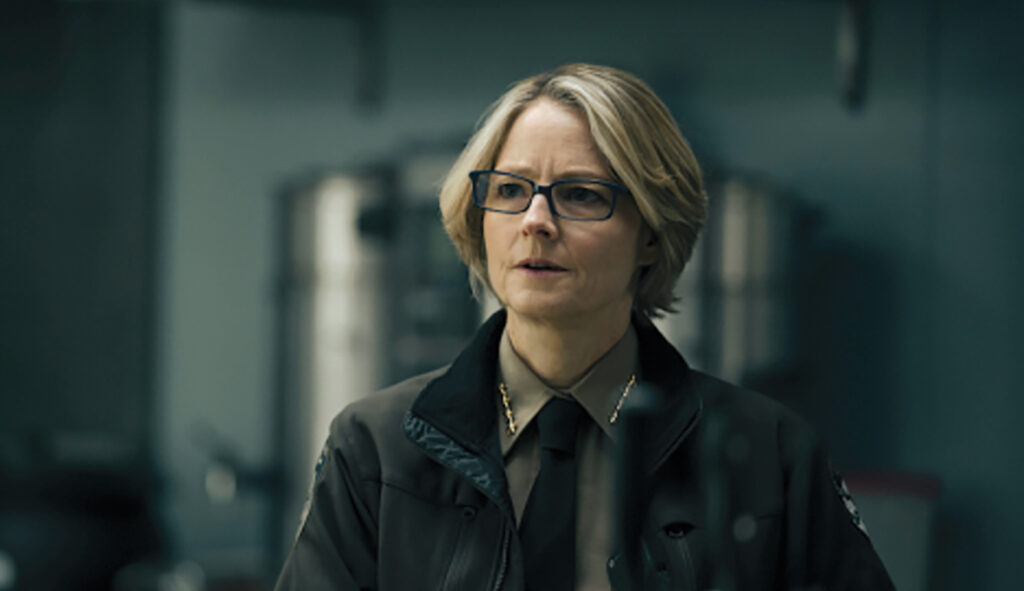In its three previous outings, the HBO anthology series True Detective used police work to explore and defend masculine virtues. The show’s new season abandons that project, inaugurating instead a novel television genre in which radical environmentalism, racial complaint, and the occult vie for narrative supremacy. Call it woke Gothic. Or don’t call it anything at all. An awful True Detective season can’t hurt you if you decline to watch it.
TD4 (aka True Detective: Night Country) takes place in Ennis, Alaska, a fictional village in the general vicinity of Fairbanks. Like many a company town, Ennis suffers from employer-resident tensions attributable to no single cause. Yes, the local mining concern may be polluting the water, but the area’s Inuit population would resent its presence on the land regardless. Something similar is true of a nearby research outpost that treats Indigenous people as little more than a source of cheap janitorial labor.
It is at that very outpost that viewers encounter the first of the season’s defining crimes. Someone, or something, has forced the Tsalal Arctic Station’s scientists onto the ice to freeze. Their bodies, found curiously naked, show signs not only of self-harm but of the abject terror in which they died. More baffling still is the discovery, in the station’s abandoned living quarters, of a human tongue belonging to a murdered Inuit activist. If, as seems clear, the new case is connected to the old one, it is anyone’s guess what vile forces are at work.

Tasked with solving these crimes are a pair of officers who, as is True Detective’s wont, produce near-constant interpersonal sparks. Liz Danvers (Jodie Foster) is Ennis’s grizzled police chief, a veteran sleuth with a knack for asking the unexpected question. Evangeline Navarro (Kali Reis) is Danvers’s Native partner, decades younger but possessed already of an unquenchable fury. It is hardly worth pointing out that both characters are cop show cliches: Danvers the hardass girlboss and Navarro her trigger-happy id. What is worth dwelling on is the fact that neither actress is particularly believable in her role. Having made her bones on nuanced vulnerability (Taxi Driver, The Silence of the Lambs), Foster struggles mightily to pull off unsubtle toughness. Reis, while less obviously miscast, is herself limited. If the professional boxer-turned-screen star has a register beyond simmering anger, it isn’t on display here.
Written and directed by Mexican filmmaker Issa Lopez, TD4 represents, in many ways, a departure from the series’s earlier habits. Set during the first two weeks of the Arctic Circle’s “long night,” the latest installments lean far more heavily on visual horror than did any previous ones. Absent, conversely, are the dueling timelines that lent complexity to seasons One and Three, inviting viewers to consider how obsession, even with justice, can warp a life. Through two episodes of the current run, I was ready to declare TD4 a garden-variety procedural released under the True Detective banner to drum up interest. What I failed to anticipate was how shamelessly Lopez would come to lean on the crutch of Season One’s mythology, cribbing not only names and images but actual dialogue in an attempt to borrow the inaugural outing’s magic.
It is not surprising that one of the great TV successes of the 21st century should throw a long shadow. Where TD4 errs is in its total misunderstanding of what made the franchise’s first season superb to begin with. At once philosophical and sober-minded, Season One was so tightly put together that its proto-QAnon plot felt like the height of realism. Season Four, by contrast, is a dog’s breakfast of left-liberal biases and causes celebres, plainly assembled for the soothing of progressive vanity. All the villains are evil white people. No, wait: They’re evil law enforcement officers, evil corporations, evil men. Why not just say Trump did it and send everyone home?
There is room, of course, for television shows that bear puerile ideologies. I would be lying if I claimed never to have enjoyed Homeland or The West Wing. If TD4 occupies a special class of dreadfulness, it is due to the season’s noxious blend of the political and pagan, an admixture that further exposes the show’s bad thinking even as it introduces a ridiculous demon-ex-machina plot.
Lurking behind Ennis’s visible life is an Inuit spirit beast that may or may not take occasional form as a hulking, one-eyed polar bear. A figure of Native reverence, this being will remind some viewers of the Tuunbaq, the monstrous creature that haunted Season One of AMC’s 2018 production The Terror. The difference between the two shows — one brilliant, the other a warmed-over hash — could hardly be more pronounced. A heady tale of survival, The Terror respected, but was wary of, Native mysticism. TD4, on the other hand, embraces it as a means by which people “of color” can get justice against whites. The very notion is nauseating. But it is not unexpected. Having made considerable headway in the sciences, Indigenous “Ways of Knowing” are now coming for the arts.
Does TD4 tie its disparate strings into a bow? In part, yes. Yet the deeper question is whether audiences that aren’t already sold will suffer through this dreary, grim, laborious mess of a television program. “She’s awake,” various characters hear and say over the course of six increasingly tedious episodes. Stick with True Detective: Night Country long enough, and you won’t be.
CLICK HERE TO READ MORE FROM THE WASHINGTON EXAMINER
Graham Hillard is a Washington Examiner magazine contributing writer and editor at the James G. Martin Center for Academic Renewal.
